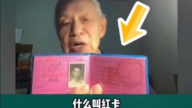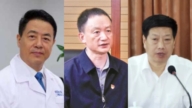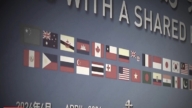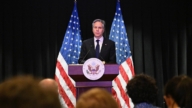【新唐人2014年11月11日訊】中日關係因釣魚島主權問題一直徘徊在歷史低點,就在外界紛紛猜測中日領導人能否在APEC峰會期間會面的時候,北京忽然傳來兩國首腦正式會晤的消息,引發了各界關注。尤其是習近平在會見安倍時的異常表情,更是令輿論揣測中日雙方的關係是否能夠真的「破冰」。
據《新華社》報導,11月10號早間,中共國家主席習近平和日本首相安倍晉三在北京人民大會堂開始了正式會談,並在會晤結束後召開了記者發佈會。這是3年來中日首次首腦峰會,也是雙方各自成為自己國家最高領導人後,首次在公開場合正式會晤。
儘管這次會談在外界看來是中日關係破冰的一絲曙光,但也有聲音認為中方似乎並不情願——英國廣播公司《BBC》在報導指出,從中共央視播放的電視畫面可以看出,習近平在會晤安倍時,面部表情生硬嚴肅,沒有露出任何笑容。
《BBC》說,經過兩年的敵視後,習近平終於對安倍晉三作出讓步,促成了這次會面。《新華社》則形容稱,這次會談是習近平「應約」參加的。
不過,《BBC》在另外一篇報導中,引述中國上海社會科學院亞太研究所研究員劉鳴的話說,這個會談基本上還是形式上的一個會談,雙方是在被迫的情況下演出了這場政治秀。
此前因為中日關係降到冰點,甚至一度處於爆發公開衝突的邊緣 ,外界對於雙方會面能否達成多抱有懷疑和觀望態度。尤其中共官媒《環球時報》引述接近中方消息人士稱,中共外交部長王毅和日本外相岸田文雄的會談「並不十分理想和愉快」。 令外界對於兩國關係緩和更加不看好。
對此,多家外媒曾分析,即使中日雙方會面可能顯示了緩解僵局的意願,但也是短暫而不具實質意義的。除非有一方願意就釣魚島主權等問題,做出真正讓步。
上海復旦大學日本研究中心馮煒教授表示,他曾與一位有著日本政府背景的日本學者在交談中了解到,日本曾經試圖在釣魚島問題上作出讓步,但雙方最終沒能達成一致。
上海復旦大學日本研究中心馮煒教授:「他說曾經有一次,就出現這樣的情況,就是日方提出中方停止釣魚島海域巡航的話,日本可以考慮承認存在爭議。那麼中方的態度是你承認爭議,我就停止巡航。也就是說這變成先有雞還是現有蛋的問題。」
有分析指出,此次的中日首腦能夠成功會晤,雖然可能與日方就釣魚島問題的暫時讓步,以及四項原則共識的達成有關,但最關鍵的還是中共急於打破與多個國家間的外交僵局,尤其恰逢APEC聚會,更為中共當局提供了一個絕好的「順水推舟」的機會。
馮煒:「坦率地說,中國現在要緩和周邊的局勢,現在也是很緊迫的任務。和日本繼續這樣對抗下去的話,對日本不利,對中國也不利,其實雙方都很清楚。」
據《BBC》報導,安倍在會談後表示,此次會談是「日中兩國重返戰略互惠關係的原點,也是改善關係的第一步」,他也在會中向習近平建議,儘早建立海上緊急聯絡機制,並稱兩國為此「將展開具體工作」。
馮煒:「隨著這次四項原則共識的達成,就要花時間解決這些問題,我相信只要彼此不進入雙方海域,不登島,我想應該是目前雙方會採取的基本辦法。」
台灣國立政治大學國際關係研究中心研究員蔡增家,刊發評論文章表示,中日兩國對這四點共識的各自表述、各說各話,也凸顯出中日兩國之間政治信任基礎的薄弱。「習安會」如果不能對兩國的歷史問題、領土爭議等問題開誠佈公的溝通,那麼四點共識將不會是中日關係重新開展的起點,而會是中日對話的終點。
採訪/秦雪 編輯/張天宇 後製/葛雷
China and Japan Conduct Icy Talks at APEC.
The Chinese Communist Party (CCP) has been at its historical
low point in the relationship with Japan.
This is due to the sovereignty dispute of the Diaoyu Islands.
The two countries finally met during the APEC summit in
Beijing watched by the world.
Xi Jinping’s icy expression in the press conference has people
doubting if the two countries have really “broken" the ice.
Xinhua News Agency reported on Nov. 10 that Chinese
President Xi Jinping had a formal meeting with Japanese
Prime Minister Shinzo Abe in Beijing’s Great Hall. A
briefing was held after the talk.
This is the first official meeting between the two leaders
in three years since they took up their offices.
Although the talks seemed to bring hope to the relationship
between the two countries, the BBC reported that, Xi’s body
language at the meeting was calculatedly icy. During the
handshake he did not smile.
The BBC reported, after two years of Chinese animosity to
Japan’s new prime minister, President Xi finally relented.
Xinhua described the meeting was Xi Jinping’s response
to the invitation.
BBC Chinese report quoted Liu Ming, at the Institute of
International Relations, Shanghai Academy of Social
Sciences, saying the talks is basically involuntary, a
form of political show.
The China-Japan relations are down to the verge
of open confrontation.
Many have doubted the possibility of a meeting
between the two sides.
The easing of relations seemed even less promising
after a report from Global Times.
It described the talks between Chinese Foreign Minister
Wang Yi and Japanese Foreign Minister Fumio Kishida
as “not exactly satisfactory or enjoyable" as quoted by
sources close to the Chinese side.
A number of foreign media have analyzed, even though
the meeting may show both countries’ willingness to ease
the deadlock, but it was short and impractical, unless one is
willing to yield on the sovereignty issue over the Diaoyu Islands.
Professor Feng Wei, Center for Japanese Studies, Fudan
University, said Japan has tried to yield on the territory issue.
However they have failed to reach an agreement, according
to his conversation with a Japanese scholar who has a
government background.
Professor Feng Wei: “He said Japan has proposed that
if China stops cruising around the Diaoyu Islands, Japan
will consider recognizing the dispute.
But, the CCP insisted that if Japan recognizes the dispute,
China will stop cruising around.
It became a question of chicken first or egg first."
Some analysts pointed out that the temporary concession
on Japan’s side could have prompted the meeting.
The principles and spirit of the four political documents
between the two countries could also have contributed
to the meeting.
However, mostly likely it is the CCP who is eager to break
the diplomatic impasse with a number of countries.
APEC has provided a grand opportunity for the CCP.
Feng Wei: “Frankly, it is China’s urgent task to ease
its diplomatic tension with surrounding countries.
The opposing situation is bad for Japan and for China.
Both sides are clear about it."
Abe said the meeting was “the first step for improving ties
by returning to mutually beneficial relations based on
common strategic interests".
He said they had agreed to start preparations to establish
a maritime crisis mechanism, reported the BBC.
Feng Wei: “With the consensus of the four principles,
these issues will take time to resolve.
I believe both sides will take the approach of not entering
the waters and not landing on the islands."
Zheng-Jia Tsai, researcher, Institute of International Relations,
National Chengchi University, has commented in his article.
He stated that China and Japan, have different definitions
of the four principles.
These reflect the lack of political trust
between the two countries.
For lack of an honest communication over the historical
territory disputes in the meeting, the four principles,
rather than beginning a new development for the two
countries, will become the end of the dialogue.
Interview/QinXue Edit/Zhang Tianyu Post-Production/GeLei





























